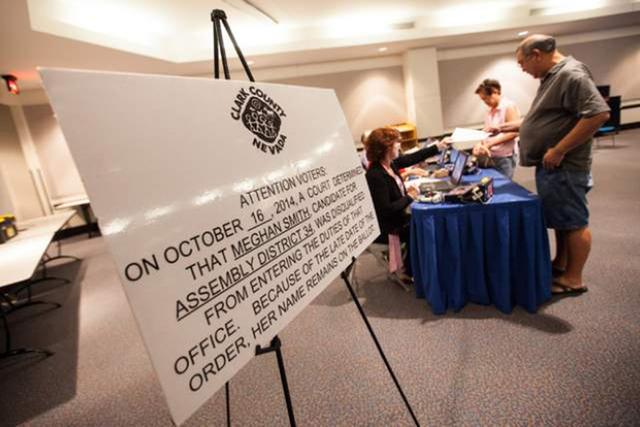We need new attitude, not new laws, on lawmaker residency
Is it really that super-hard for would-be members of the state Legislature to live in the districts they want to represent?
It’s not like the maps change; districts are only re-drawn once every 10 years. And it’s not like you have to make a long-term commitment: If you’ve lived in Nevada for a year, you only have to live in an Assembly or Senate district you want to represent for 30 days before filing closes.
But now, for the second time in as many elections, we have a District Court judge deciding a would-be member of the Assembly didn’t really live in the district she’s seeking to represent by the deadline. And we have the potential to repeat the sorry spectacle that took place in 2013: The Legislature ignored a court’s finding and a state law that disqualifies nonresidents, and seated the lawmaker anyway.
This time, the Republican nominee in Assembly District 34, Victoria Seaman, sued her Democratic foe, Meghan Smith, alleging that Smith failed to meet the 30-day residency requirement found in NRS 293.1755(1). District Court Judge Nancy Allf agreed, ruling that Smith wasn’t a bona fide resident of the district, and ordered signs announcing Smith’s disqualification be posted at polling places pursuant to NRS 293.184(2).
Smith appealed that order to the Nevada Supreme Court, unsuccessfully. The signs remain.
But the district has more Democrats than Republicans, which means Smith could still win the election. And that’s where the really interesting questions will arise.
In 2013, a District Court judge ruled on the day before Election Day that Andrew Martin didn’t really live in Assembly District 9. Signs were posted, but Martin won anyway. And while NRS 293.182(5)(b) and 293.184(1)(b) said he should be disqualified from holding the office, the Assembly seated him anyway.
How? Because the Nevada Constitution (in Article 4, Section 6) declares “Each House shall judge of the qualifications, elections and returns of its own members….” In other words, if the Assembly decides a person was duly elected, that person gets to serve, no matter the residency requirements of the NRS or the findings of a judge.
Now, Assembly Speaker Marilyn Kirkpatrick and her fellow lawmakers could have followed the law, if they were so inclined. They could have said we respect the ruling of the judge, and we will not seat Martin. The seat would have been declared vacant, and under NRS 218A.260, the Clark County Commission would have appointed a replacement to fill the seat. (The appointed person must be a member of the same political party as the former incumbent, so the balance of power in the chamber would not be affected.)
Instead, Kirkpatrick and her fellows let Martin take his seat, and, in an unnecessary gesture of total contempt for state statutes, they placed Martin on the temporary credentials committee, the group of lawmakers that determines who’s eligible to be seated.
And it doesn’t look as if much has changed. Kirkpatrick said the Legislature will wait for the election results before deciding how to proceed. “At this point, our No. 1 goal is to win the seat,” Kirkpatrick told the Review-Journal. “Then the Legislature as a whole will look at all of the options.”
In 2013, Kirkpatrick and her Republican counterpart, Assembly Minority Leader Pat Hickey, brought a bill that would have kept the residency requirement in law, but removed the authority of the District Courts to hear residency challenges after a June deadline to change ballots has passed. It would have specified that all challenges to residency must be made in the Assembly itself, and provided that people who file frivolous complaints would have to pay fees and costs. That bill passed the Assembly but died in the Senate.
But even more than a change in law, we need a change in attitude. The leaders of both parties should commit that anyone who a judge has found doesn’t really live in the district he or she is seeking to represent won’t be seated in the Legislature, even if the Constitution allows them to do so. Or get rid of the residency requirement entirely. Either is better than simply ignoring the law as it stands.
Steve Sebelius is a Review-Journal political columnist who blogs at SlashPolitics.com. Follow him on Twitter (@SteveSebelius) or reach him at 702-387-5276 or SSebelius@reviewjournal.com.






















